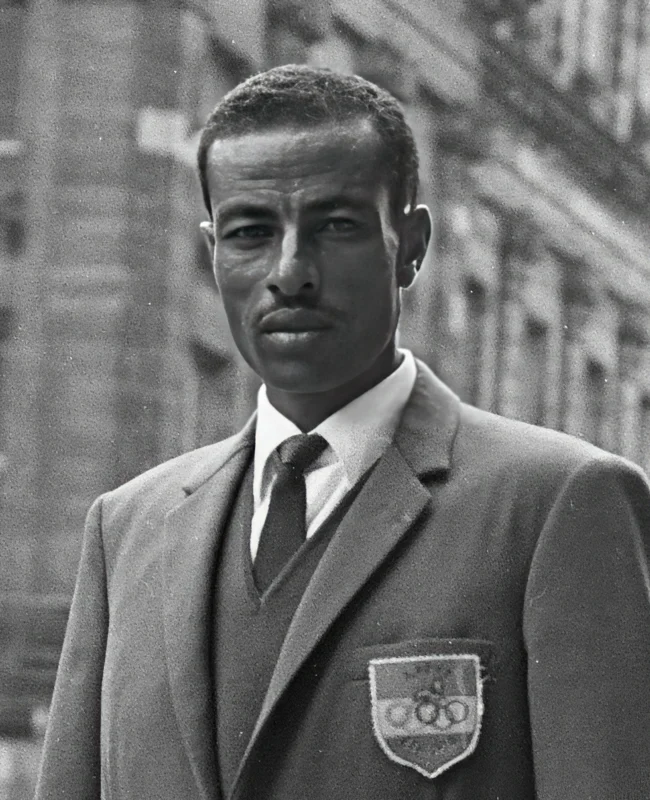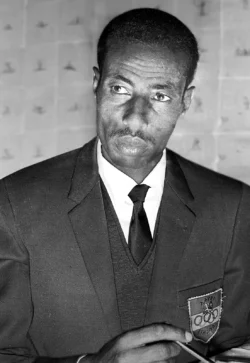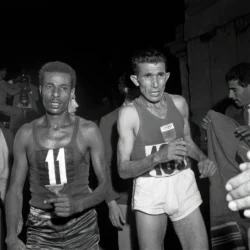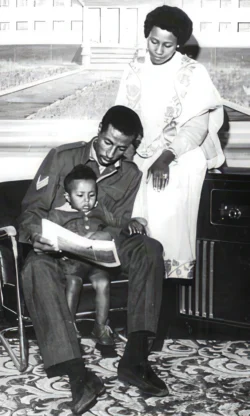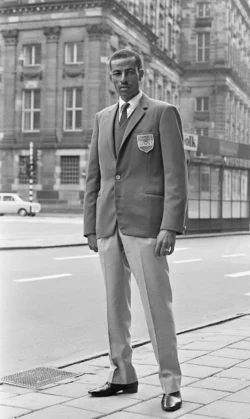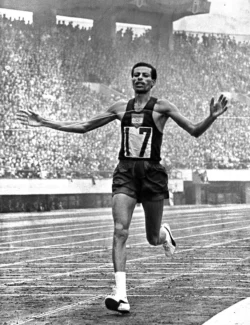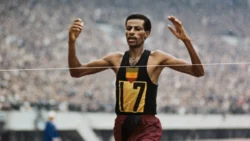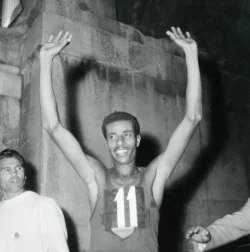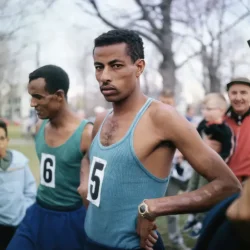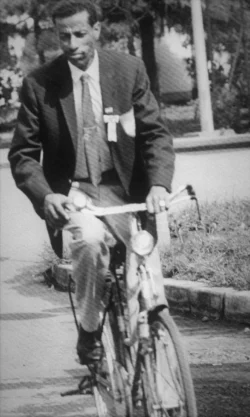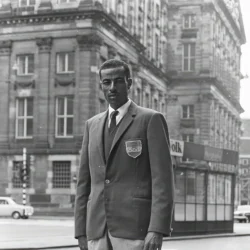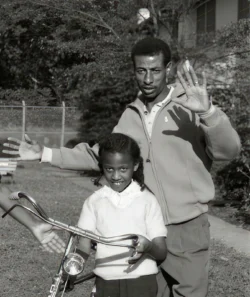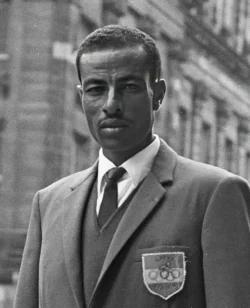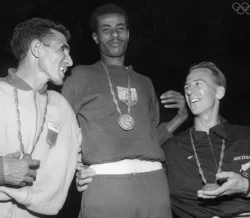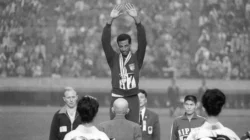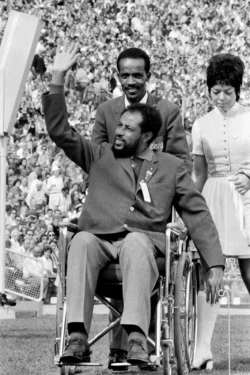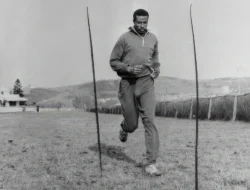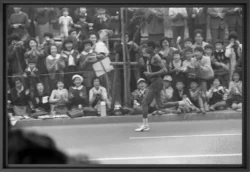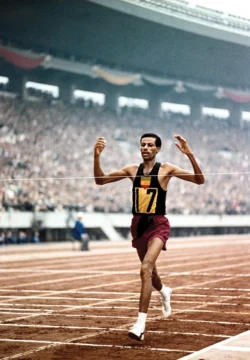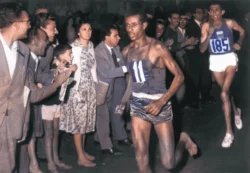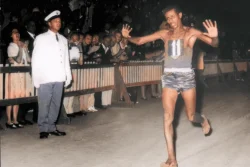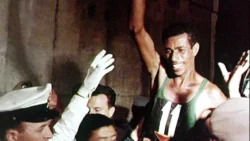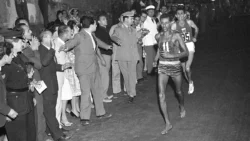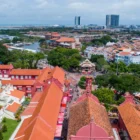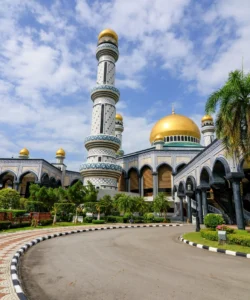Name: Shambel Abebe Bikila
Introduction: Abebe Bikila was an Ethiopian marathon runner who achieved legendary status as a back-to-back Olympic marathon champion. He is a pioneering figure in African sports, being the first black African to win an Olympic gold medal, and is most famously remembered for winning his first gold medal at the 1960 Rome Olympics while running barefoot.
Date of birth: August 7, 1932
Died: October 25, 1973 (aged 41), in Addis Ababa, Ethiopia, due to complications from a car accident that had left him paralyzed.
Height: Approximately 5 feet 10 inches (1.77 m)
Place of birth: Jato, Shewa, Ethiopian Empire (a small village about 120km north-east of Addis Ababa).
Family:
- Parents’ names: Wudinesh Beneberu (mother) and Demissie (her second husband, father). His father was a shepherd.
- Siblings: Information not widely publicized.
- Spouse: Yewebdar Wolde-Giorgis (m. 1960).
- Children: He had four children with Yewebdar Wolde-Giorgis. Their names include Yetnayet, Tsige, and Teferi.
- Relatives: His parents, wife, and children.
Profession: Marathon runner (retired), Imperial Guard soldier.
Nationality: Ethiopian
Religion: He was buried in Saint Joseph Church in Addis Ababa, suggesting an affiliation with the Ethiopian Orthodox Tewahedo Church, which is the predominant religion in Ethiopia.
College or university attended: He received early education at a local traditional school until the age of 12. He later joined the Ethiopian Imperial Guard, where he received military training.
Biography and What Famous For:
Abebe Bikila spent his childhood in a mountainous region of Ethiopia, where his father worked as a shepherd. Growing up, physical activity, including playing a traditional long-distance hockey game called “gena,” developed his natural stamina and lung capacity. In 1952, at the age of 20, he moved to Addis Ababa and joined the 5th Infantry Regiment of the Ethiopian Imperial Guard, an elite division responsible for safeguarding the emperor.
His talent for long-distance running was spotted by Onni Niskanen, a Swedish coach employed by the Ethiopian government to train the Imperial Guard. Niskanen began training Bikila for marathons.
Abebe Bikila is most famous for his unprecedented achievements in Olympic marathons:
- 1960 Rome Olympic Marathon Gold Medal (Barefoot): This is his most iconic victory. At the 1960 Rome Olympics, Bikila arrived with ill-fitting shoes that caused blisters. He made the historic decision to run the entire 42.195 km marathon barefoot. In a stunning display of endurance and determination, he won the race in a world record time of 2 hours, 15 minutes, 16.2 seconds, crossing the finish line near the Arch of Constantine. This made him the first black African Olympic gold medalist, and the image of him running barefoot through Rome’s historic streets became one of the most enduring Olympic moments. He passed the Obelisk of Axum (which had been plundered from Ethiopia by Italy) near the end of the race, making a decisive surge there.
- 1964 Tokyo Olympic Marathon Gold Medal (First to Defend Title): Four years later, despite having undergone an appendectomy just 40 days before the race, Bikila returned to the Olympics in Tokyo. This time he ran in shoes and socks, but his performance was even more dominant. He took a clear lead by the halfway mark and steadily pulled away from the field, winning by more than four minutes. His time of 2 hours, 12 minutes, 11.2 seconds was another world record and made him the first athlete in history to successfully defend an Olympic marathon title.
- Inspiration for African Runners: His success sparked a wave of interest and participation in long-distance running in Ethiopia and across Africa, contributing to the continent’s later dominance in the sport.
Bikila competed in his third Olympic marathon at the 1968 Mexico City Games, but had to withdraw due to injury. Tragically, in 1969, he was paralyzed from the waist down in a car accident. Despite his paralysis, he continued to participate in sports, competing in archery and table tennis at the 1970 Stoke Mandeville Games (a precursor to the Paralympics) in London and winning a cross-country sleigh-riding event for disabled athletes in Norway in 1971.
Abebe Bikila passed away in 1973 from complications related to his accident. He remains a national hero in Ethiopia, with a stadium in Addis Ababa named in his honor.
Have participated:
Olympic Games:
- 1960 Rome Summer Olympics: Gold Medal (Marathon) – running barefoot, setting a world record.
- 1964 Tokyo Summer Olympics: Gold Medal (Marathon) – first athlete to defend an Olympic marathon title, setting another world record.
- 1968 Mexico City Summer Olympics: Competed, but did not finish due to injury.
Other Marathons (Selected Wins):
- Addis Ababa Armed Forces Championship (1960)
- Athens Classical Marathon (1961) – barefoot
- Osaka Marathon (1961)
- Košice Peace Marathon (1961)
- Enschede Marathon (1963)
- Seoul International Marathon (1966)
- Zarautz International Marathon (1966)
Paralympic/Disabled Sports:
- 1970 Stoke Mandeville Games (archery, table tennis)
- 1971 Norway cross-country sleigh-riding event (won)
Military Service:
- Ethiopian Imperial Guard (rose to the rank of Captain, known as “Shambel” in Amharic).
Awards and Recognitions:
- Order of Menelik II (Ethiopian civilian award)
- Star of Ethiopia award
- Stadium in Addis Ababa named after him.
- Statues commemorating his achievements in Ethiopia and Rome.
Abebe Bikila Photos:
